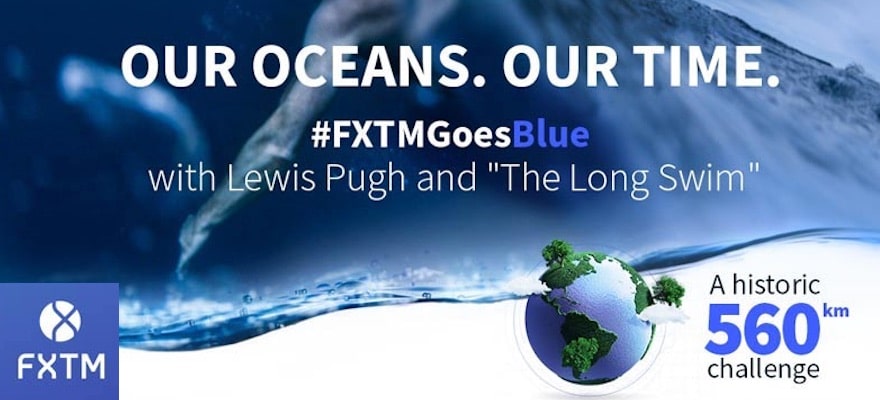At the end of last year, viewers around the world witnessed the perfidious nature of oceanic plastic during the BBC’s Blue Planet II. Confused albatrosses fed their young plastic waste, including shopping bags and packaging, believing it to be food.
Images of the deceased chick’s plastic-filled innards circulated across the internet. The message was clear: plastic is damaging the environment, polluting the seas and taking its toll on the ocean’s wildlife, writes FXTM staff writer Natasha Keary.
The message wasn’t as clear to some, however. Along with his recent refusal to toe the line on trade at the latest G7 summit, US President Donald Trump refuses to cooperate with other world leaders in global environmental initiatives.
Canada, France, Germany, Italy and the UK have all signed a charter pledging to reduce plastic waste in the oceans. The US and Japan have not, as yet, joined the pledge to take steps to reduce their countries’ contributions to ocean pollution.
Identifying the problem
The global plastic problem won’t wait for them to change their minds. Statistics released at the start of 2018 claimed that there will be more plastic waste than fish in the oceans by 2050. Every minute, it’s estimated that one refuse truck’s worth of plastic is dumped into the seas – this amounts to 8 million tonnes of waste plastic a year.
Plastic straws, shopping bags and bottles are the main offenders. They make their way into even the most remote habitats, poisoning marine life. Microbeads and microplastic particles (used in beauty products and produced by the decomposition of larger plastic pieces respectively) also pose a threat.
Carelessness during the manufacturing processes of these products results in the lentil-sized pellets, known as ‘nurdles’, being released into the seas. Once eaten by unsuspecting marine life, these pellets release damaging toxins which subsequently spread throughout the food chain.
At the same time, ocean ecosystems are under threat from increasing acidification. Up to 40% of carbon dioxide released from human activity is absorbed into the oceans, decreasing the pH of the waters. With increasing acidity, the calcium-based shells of many sea creatures dissolve over time.
Rising water temperatures contribute to large-scale coral bleaching, a process in which reefs destroy themselves by expelling vital algae. In 2016, the Great Barrier Reef lost 50 per cent of its coral to bleaching.
Luckily, there is a silver lining. Initiatives like the UN’s Clean Seas campaign are encouraging nations to take firm steps to reduce waste. The EU has recently proposed a total ban on plastic cutlery and straws, and India will introduce fines of up to Rs 10,000 for anyone who is seen using a plastic bag.
The Long Swim
By addressing the main culprits, these nations will make a difference to the quantity of plastic waste that enters the oceans. However, more action is still needed to raise awareness and compel nations to fully commit to protecting our oceans. Action like The Long Swim.
The Long Swim, sponsored by award-winning global broker FXTM, is endurance swimmer and environmentalist Lewis Pugh’s attempt to swim the entire length of the English Channel. The swim has never been completed before and will be undertaken with only a pair of Speedos, goggles and a cap for protection.
The goal? To persuade governments around the world to designate 30% of global waters as fully-protected marine reserves by 2030 in a campaign called Action for Oceans. Nicholas Defteras, CEO of FXTM, commented: “FXTM is truly honoured to be the lead supporter of The Long Swim. We take our corporate responsibility to heart, and are proud to join renowned activist Lewis Pugh in raising awareness for our endangered seas. It’s never too late to make a difference and it’s high time we all stepped up our efforts to preserve our oceans.”
The record-breaking swim takes place this summer, from Land’s End on the 12th of July to the estimated finish on 29th of August in Dover. During the challenge, Lewis and FXTM will be raising awareness of the perils facing our oceans. Tune in to Sky News every day to follow Lewis’ journey along the Channel, and keep track of the Swim with the #FXTMgoesblue hashtag on social media.
It’s time to take drastic steps – the future of the oceans and our planet’s heath is at stake. Find out more about The Long Swim at
Disclaimer: This written/visual material is comprised of personal opinions and ideas. The content should not be construed as containing any type of investment advice and/or a solicitation for any transactions. It does not imply an obligation to purchase investment services, nor does it guarantee or predict future performance.
FXTM, its affiliates, agents, directors, officers or employees do not guarantee the accuracy, validity, timeliness or completeness of any information or data made available and assume no liability for any loss arising from any investment based on the same.
Risk Warning: There is a high level of risk involved with trading leveraged products such as forex and CFDs. You should not risk more than you can afford to lose. You should not trade unless you fully understand the true extent of your exposure to the risk of loss. When trading, you must always take into consideration your level of experience. If the risks involved seem unclear to you, please seek independent financial advice.





Be First to Comment